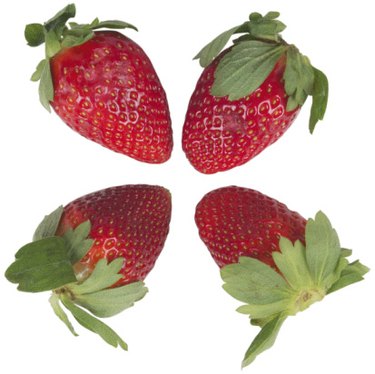Things You'll Need
10-10-10 garden fertilizer
Strawberry plants
Irrigation tubing

Strawberries, one of the most popular small fruits of the summer months, can be easily grown in most home gardens. Growing season varies, based on the area of the U.S. you live in. Some areas allow for up to three production cycles in one year while other areas will allow for only one cycle. Following specific planting guidelines will ensure the grower can make the most of each cycle, producing a crop of juicy, giant strawberries.
Step 1
Choose a location for the strawberries in an area that offers full sunlight for a minimum of eight hours per day to ensure the best quality and size berries. Plant the strawberries in raised beds to avoid drainage problems.
Video of the Day
Step 2
Create the raised beds for your plants. Dig a trench approximately 3 inches deep and place the irrigation tubing in place. Add approximately 2 inches of soil on the tubing, and then add the fertilizer prior to planting the strawberries.
Step 3
Place the rows 36 to 48 inches apart and the plants 15 to 24 inches apart in each row. Place each plant into the ground, with the crown of the plant set on the surface of the soil. Firmly but gently pack the soil around the roots and water each plant. Strawberries require plenty of water to reach maximum growth and maximum berry size. Each plant will require a minimum of 1 to 1-and-1/2 inches of water weekly.
Step 4
Pinch the flowers off as they appear. This promotes plant growth and the formation of runner plants. Runners may need to be repositioned to ensure no more than five plants per square foot remain. Taking these steps during the first season works to ensure that the plants yield giant strawberries during their second season.
Step 5
Fertilize the plants to promote growth. Weed control, essential in the production of giant strawberries, will require considerable cultivating to maintain.
Tip
Placing black polyethylene sheets in the garden prior to planting the strawberries will provide easy weed control. Strawberry plants should not become too dense. Keep the plants thinned to five or six per square foot to ensure production of giant strawberries.
Warning
Commercial fertilizer, after long-term use, can burn the plants, causing them to die. For best results, plant in an area that has not had any type of crop in three or more years.
Video of the Day
- University of Florida; Growing Strawberries in the Home Garden; C.K. Chandler, et al.
- Purdue Department of Horticulture; Growing Strawberries; Bruce Bordelon; December 2001
- Hortiscope: Questions on Strawberries; Ron Smith
- OSU Extension; Strawberries are an Excellent Fruit...; Gary Gao
- University of Florida: Strawberry Cultivars for Annual Production Systems